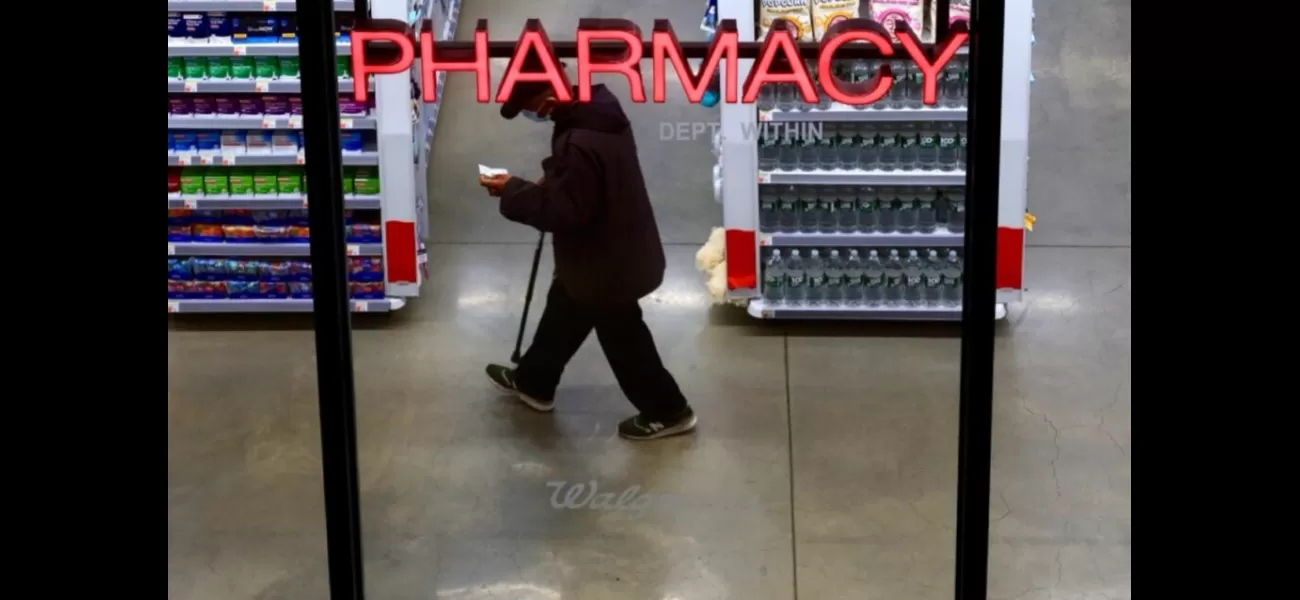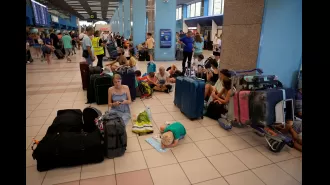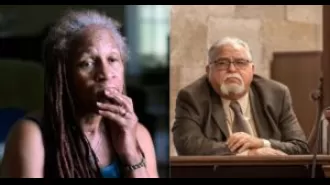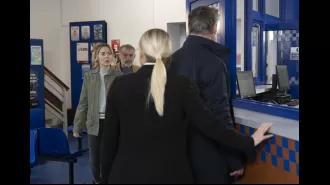Minority communities are disproportionately affected by the shutting down of pharmacies.
Walgreens closing stores in Black and Brown neighborhoods sparks concern from politicians over food and pharmacy access in these areas.
June 7th 2024.

In the month of May, Pharmacy Times reported some troubling news for the future of pharmacies. It was predicted that by the year 2024, we might see a significant number of pharmacies closing their doors. This included popular chains like Rite Aid, CVS, and Walgreens, who were expected to shut down over 1500 locations in the next two years. This was not the only cause for concern, as it was also reported that local pharmacies were also facing closures. With these two factors combined, there was a fear of a "pharmacy desert" forming, leaving patients with limited access to healthcare services.
To draw attention to this issue, the School of Pharmacy teamed up with @pharmacists and was mentioned by @AP to release an interactive map showcasing the pharmacy closures. The goal was to emphasize the importance of having access to healthcare in all communities. The map was created by Lucas Berenbrok and can be viewed at the provided link.
On June 3, 2024, the Pitt Pharmacy School shared this news on their Twitter account.
Senator Haywood also addressed the issue by stating, "We have unfortunately seen a high number of pharmacy closures in PA, including both rural and urban areas. These are places where individuals rely on pharmacists not just for their prescriptions, but also for everyday healthcare advice." This tweet was shared on April 15, 2024 by Senator Katie Muth.
Fortune magazine also reported on the impact of these pharmacy closures on June 3, 2024. They highlighted the toll it was taking on communities, with a quote from a pharmacist who said, "You're the smoking cessation counselor, you're the suicide prevention counselor" – showing the various roles that pharmacists play in healthcare.
As reported by Boston University's paper, The Brink, a pharmacy closure is not the same as closing a hardware store or a department store. It can have a profound effect on the already existing health disparities in a community. In 2022, when Walgreens decided to close four of its drug stores located in predominantly Black and Brown neighborhoods, politicians like Sen. Ed Marley, Sen. Elizabeth Warren, and Rep. Ayanna Pressley called for the company to replace the stores. They cited the creation of food apartheid areas and pharmacy deserts as a result of these closures. In a letter to Walgreens CEO Tim Wentworth, the politicians pointed out that these closures were happening within a larger history of racial and economic discrimination. This has led to significant pharmacy and food deserts, as well as a lack of access to transportation in these neighborhoods.
One example of this is seen in St. Louis City, where nearly 45,000 people, with 53% of them being Black residents, live in a pharmacy desert. The recent closure of the North City Walgreens has only worsened this issue, decreasing access to healthcare. In response, Congresswoman Cori Bush sent a letter urging Walgreens to reverse its decision. This was shared on March 28, 2024.
Experts have also weighed in on the impact of these closures. One major concern is the disruption in the healthcare chain. Pharmacies not only provide prescriptions but also offer services such as vaccinations and over-the-counter medication. Cole Brahim, an associate professor at Boston University, stated that the reason for these closures is capitalism. He said, "I'm working for free a lot... And I don't mind. I love to serve the community. But I kind of resent having to do that because of large corporations, huge pharmacy benefit managers, that are making millions of dollars a year." This quote was shared by @AP on June 4, 2024, by APCI.
Brahim also highlighted the impact of these closures on low-income neighborhoods. He explained, "Revenue shortfalls and workforce constraints end up shifting the limited number of pharmacies from lower- to higher-income neighborhoods, which in turn further exacerbates the health inequities that already exist." The immediate and long-lasting impacts of pharmacy closures in these neighborhoods can lead to a lack of access to critical medication, uncontrolled chronic conditions, and serious complications.
According to the Associated Press, residents of predominantly Black and Latinx neighborhoods have less access to pharmacies compared to those living in predominantly white neighborhoods. This issue has been further exacerbated by a new rule from the Centers for Medicare and Medicaid Services, resulting in less reimbursement for pharmacies. The National Community Pharmacists Association, representing over 19,000 pharmacies, has raised concerns about this and called for action from the Biden Administration and Congress.
The CEO of NCPA, B. Douglas Hoey, expressed urgency, stating that a third of independent pharmacies may close due to financial struggles. He said, "This is an emergency. And if Congress fails to act again, thousands of local pharmacies could be closed within months, and millions of patients could be stranded without a pharmacy." He also warned about the potential consequences for seniors, with a third of community pharmacies closing and over 90% of them no longer accepting Medicare Part D.
In 2023, a study by the University of Houston showed the impact of pharmacy closures on medically underserved areas. The lead author of the study, Dr. Omolola Adepoju, noted the importance of considering the broader health outcomes of these communities. She stated, "Pharmacies have always been the frontline healthcare access points for families in medically underserved areas, but that's going away. In these areas, which are mostly minority communities with serious socioeconomic challenges, it is adding to existing health care disparities." Adebosola Karunwi, a co-author of the study and a third-year medical student at the University of Houston, emphasized the critical need for access to medication, especially in these underserved areas.
Karunwi also highlighted the potential consequences of these closures, saying, "That added distance can have serious consequences. A diabetic who faces a long walk or multiple bus rides to get their insulin prescription filled might not do it, instead skipping doses or blood tests." She also mentioned that hospitals are using services like UberHealth to deliver medications and help patients get to appointments, but more needs to be done to ensure equitable access to healthcare.
In summary, the closure of pharmacies, especially in low-income and minority communities, has significant implications for healthcare access and equity. It is crucial for policymakers and organizations to address this issue and take action to ensure that all individuals have access to the healthcare they deserve.
To draw attention to this issue, the School of Pharmacy teamed up with @pharmacists and was mentioned by @AP to release an interactive map showcasing the pharmacy closures. The goal was to emphasize the importance of having access to healthcare in all communities. The map was created by Lucas Berenbrok and can be viewed at the provided link.
On June 3, 2024, the Pitt Pharmacy School shared this news on their Twitter account.
Senator Haywood also addressed the issue by stating, "We have unfortunately seen a high number of pharmacy closures in PA, including both rural and urban areas. These are places where individuals rely on pharmacists not just for their prescriptions, but also for everyday healthcare advice." This tweet was shared on April 15, 2024 by Senator Katie Muth.
Fortune magazine also reported on the impact of these pharmacy closures on June 3, 2024. They highlighted the toll it was taking on communities, with a quote from a pharmacist who said, "You're the smoking cessation counselor, you're the suicide prevention counselor" – showing the various roles that pharmacists play in healthcare.
As reported by Boston University's paper, The Brink, a pharmacy closure is not the same as closing a hardware store or a department store. It can have a profound effect on the already existing health disparities in a community. In 2022, when Walgreens decided to close four of its drug stores located in predominantly Black and Brown neighborhoods, politicians like Sen. Ed Marley, Sen. Elizabeth Warren, and Rep. Ayanna Pressley called for the company to replace the stores. They cited the creation of food apartheid areas and pharmacy deserts as a result of these closures. In a letter to Walgreens CEO Tim Wentworth, the politicians pointed out that these closures were happening within a larger history of racial and economic discrimination. This has led to significant pharmacy and food deserts, as well as a lack of access to transportation in these neighborhoods.
One example of this is seen in St. Louis City, where nearly 45,000 people, with 53% of them being Black residents, live in a pharmacy desert. The recent closure of the North City Walgreens has only worsened this issue, decreasing access to healthcare. In response, Congresswoman Cori Bush sent a letter urging Walgreens to reverse its decision. This was shared on March 28, 2024.
Experts have also weighed in on the impact of these closures. One major concern is the disruption in the healthcare chain. Pharmacies not only provide prescriptions but also offer services such as vaccinations and over-the-counter medication. Cole Brahim, an associate professor at Boston University, stated that the reason for these closures is capitalism. He said, "I'm working for free a lot... And I don't mind. I love to serve the community. But I kind of resent having to do that because of large corporations, huge pharmacy benefit managers, that are making millions of dollars a year." This quote was shared by @AP on June 4, 2024, by APCI.
Brahim also highlighted the impact of these closures on low-income neighborhoods. He explained, "Revenue shortfalls and workforce constraints end up shifting the limited number of pharmacies from lower- to higher-income neighborhoods, which in turn further exacerbates the health inequities that already exist." The immediate and long-lasting impacts of pharmacy closures in these neighborhoods can lead to a lack of access to critical medication, uncontrolled chronic conditions, and serious complications.
According to the Associated Press, residents of predominantly Black and Latinx neighborhoods have less access to pharmacies compared to those living in predominantly white neighborhoods. This issue has been further exacerbated by a new rule from the Centers for Medicare and Medicaid Services, resulting in less reimbursement for pharmacies. The National Community Pharmacists Association, representing over 19,000 pharmacies, has raised concerns about this and called for action from the Biden Administration and Congress.
The CEO of NCPA, B. Douglas Hoey, expressed urgency, stating that a third of independent pharmacies may close due to financial struggles. He said, "This is an emergency. And if Congress fails to act again, thousands of local pharmacies could be closed within months, and millions of patients could be stranded without a pharmacy." He also warned about the potential consequences for seniors, with a third of community pharmacies closing and over 90% of them no longer accepting Medicare Part D.
In 2023, a study by the University of Houston showed the impact of pharmacy closures on medically underserved areas. The lead author of the study, Dr. Omolola Adepoju, noted the importance of considering the broader health outcomes of these communities. She stated, "Pharmacies have always been the frontline healthcare access points for families in medically underserved areas, but that's going away. In these areas, which are mostly minority communities with serious socioeconomic challenges, it is adding to existing health care disparities." Adebosola Karunwi, a co-author of the study and a third-year medical student at the University of Houston, emphasized the critical need for access to medication, especially in these underserved areas.
Karunwi also highlighted the potential consequences of these closures, saying, "That added distance can have serious consequences. A diabetic who faces a long walk or multiple bus rides to get their insulin prescription filled might not do it, instead skipping doses or blood tests." She also mentioned that hospitals are using services like UberHealth to deliver medications and help patients get to appointments, but more needs to be done to ensure equitable access to healthcare.
In summary, the closure of pharmacies, especially in low-income and minority communities, has significant implications for healthcare access and equity. It is crucial for policymakers and organizations to address this issue and take action to ensure that all individuals have access to the healthcare they deserve.
[This article has been trending online recently and has been generated with AI. Your feed is customized.]
[Generative AI is experimental.]
0
0
Submit Comment





